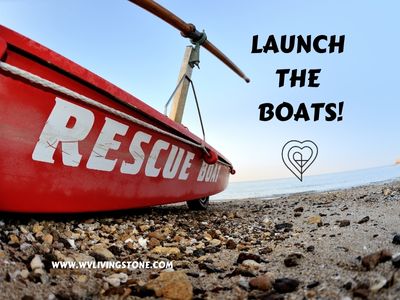Thrown in the deep end. When I started researching suicide, its causes, treatments, and prevention, it was because I was thrown in the deep end of the crisis pool. We’ve all been there, when a problem we have never given a second thought suddenly becomes real and personal. When Erin attempted suicide, there I was in the deep end. There weren’t many life preservers, and the life guards seemed to be off duty. I started frantically treading water, shouting out to others to send some help, and looking in every place where I thought there might be answers.
Raised in a family where we didn’t talk about our problems, especially embarrassing ones that would expose weakness, I had always buried things deep down inside my heart. There they created a subterranean cauldron of emotional molten lava, ready to explode onto the surface of life in bursts of misery that were disproportional and seemingly unrelated to my current situation. But if I have learned anything as a Christian, it is that keeping a stiff upper lip simply means we have hot lava in our souls that attacks God’s love for us, our salvation in Christ, and our Holy Spirit access to help. When I finally had the courage to become vulnerable and start speaking out about our pain, two things happened: I found I was not the only one dealing with this pain, and I found blessed release in naming the name of the pain out loud.
Picture, if you will, a deep lake. A mountain lake, surrounded by beautiful summits covered with evergreens. The surface of the lake is tranquil, but underneath all the water and the rocky lakebed, there is an underground volcano. People are out in the waters, swimming or struggling not to drown, while the church is picnicking on the shorelines, or maybe sending out a boat or two out to fish for men. And women. Occasionally people will be saved, brought into the boat, brought to shore, but we’re not really doing a lot to evangelize, to rescue the drowning. Now imagine that that subterranean volcano erupts, and the water starts to boil, and people are perishing. The world launches wooden boats that are soon overcrowded, swamped and burned, dumping even more people into the water, the worldly rescuers along with the perishing. Meanwhile, on shore, the church has the big boats, metal boats with insulated hulls that can withstand even the fires of hell. The boats are well equipped with life preservers and medical supplies, food and blankets, but the boats don’t launch. Crews on these boats have been steeped in the truths of Scripture and well trained in rescue and healing, but the boats don’t launch. And when the lake boils with the eruptions of suicide or addiction or domestic violence or human trafficking or crime or poverty or war or disease or natural disaster or accidents – all the woes the devil can cook up – people are not only drowning, they are dying. Dying for want of a life preserver, dying for want of some love, dying for want of soul-saving truth.
7 Things to Do to Fight Suicide is a one-hour workshop so we can become God’s lifeguards. Faith communities have traditionally buried suicide deep in the heart of the church because it is so painful and terrifying. It is hot lava. And when the church fails to take action, the world steps in and fills the void with its solutions, solutions that are clinical and emotional and have zero soul care. Worldly solutions ignore the efficacy of recognizing our God-image, of prayer, of proclaiming truth, of the healing and forgiveness of Christ, of the power of the presence of the Holy Spirit, of vocation and purpose, of spiritual warfare, of the love of the faith community.
This workshop is about launching the boats, about leaving our comfort zones in order to become God’s lifeguards, rescue operatives in the hot lava of human misery. It won’t be easy. We are directly attacking one of satan’s favorite weapons: suicide. We are attacking the underlying causes, too, which relate to many more of the devil’s favorite weapons. The enemy wants to kill, steal, and destroy; he knows that if he can get a human being to complete suicide in despair, that soul is his. We’re here to prevent that, to save lives so we can save souls. The Gospel is preached to the living, not to the dead. If life is lost to suicide, then the soul is lost as well. Save lives to save souls. That’s why we’re here. Start with: 7 Things to Do to Fight Suicide.
